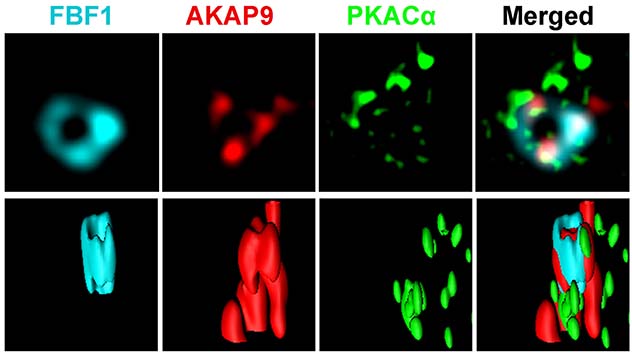 Research helps stop disease caused by defects in primary cilia
Research helps stop disease caused by defects in primary cilia
The Cilia and Ciliopathies Lab of Jinghua Hu, Ph.D., at Mayo Clinic explores how cilia form and function and relates these findings to human ciliopathies.
Overview
Sensing and responding to the environment is critical for all living beings. Primary cilia are highly conserved microtubule-based sensory organelles that extend from the cell surface of virtually all eukaryotic organisms. Cells use primary cilia to sense stimuli and convert them into physiological responses.
Cilia have been overlooked for a long time, but in the last two decades, emerging evidence shows a surprising connection between the defects in normal cilium sensory function and a wide spectrum of mammalian pathologies. So far, at least 35 human syndromic disorders (with approximately 200 causal loci cloned) have been characterized as cilia-related diseases (ciliopathies). Most ciliopathies are life-threatening disorders that affect multiple organs. Manifestations include polycystic kidney and liver, obesity and diabetes, skeletal malformation, cardiovascular diseases, and brain anomalies.
Despite the importance of primary cilia in human health, how cilia and ciliopathy proteins function in vivo remains poorly defined. The greatest challenge for basic and clinical researchers is to determine the pathogenesis of ciliopathies and identify novel and actionable therapeutic targets to prevent, delay or halt ciliopathy progression.
Dr. Hu's Cilia and Ciliopathies Lab aims to understand how cilia and ciliopathy proteins function in the context of different cell types, relating these findings to human ciliopathies. Dr. Hu's lab employs various in vivo systems from simple nematode C. elegans to advanced murine models, complemented by the use of cultured mammalian cells and human samples. These approaches elucidate the functions of ciliopathy genes in diseases, their role in disease processes and their potential as therapeutic targets.
About Dr. Hu
Dr. Hu is a researcher for the Department of Biochemistry and Molecular Biology and Division of Nephrology and Hypertension, Department of Internal Medicine at Mayo Clinic in Rochester, Minnesota. He also serves as an associate professor of biochemistry and molecular biology and medicine for the Mayo Clinic College of Medicine and Science. Dr. Hu's research explores cilia-related human diseases. Employing various disease models, his lab has developed numerous models of ciliopathies to understand pathogenesis and test the potential for diagnostic and therapeutic purposes.